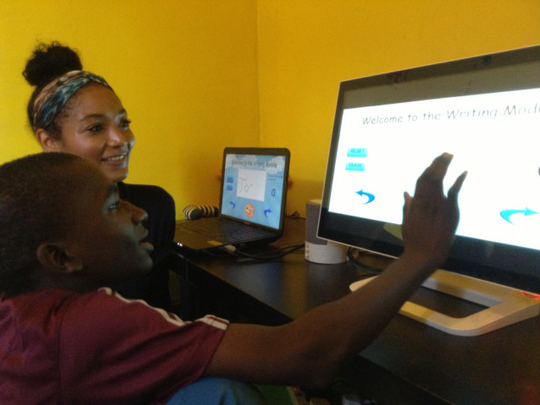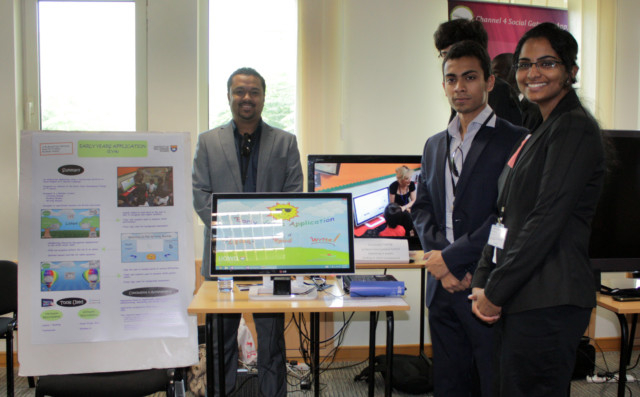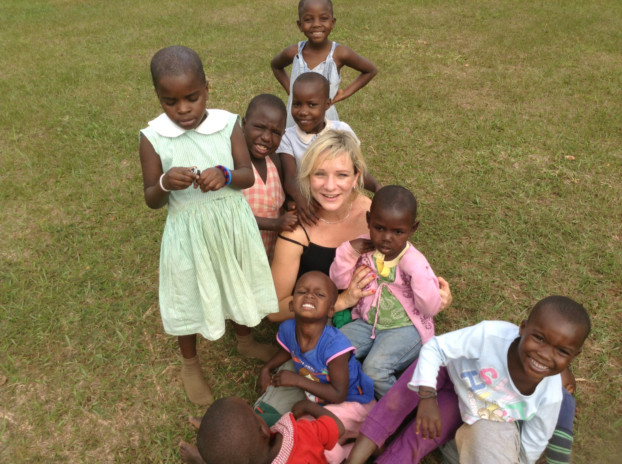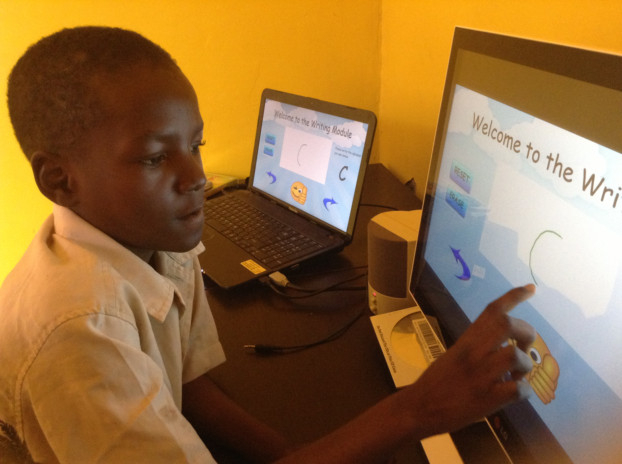
Three graduate students of Management Information Systems (MIS) at the University of Wollongong in Dubai (UOWD) have managed to develop an innovate software programme to teach English as a second language to underprivileged children living in the home for rescued kids in Uganda, an initiative by www.liveitupuganda.org. The programme won them the People’s Choice Award at the seventh annual Software Development Tradeshow at UOWD held in June this year.
The Early Years Application (EYA) application software was developed by Keerthi Prasad, SM Mushfiqur Rahman and Redwan Hasan create the program as part of their final year project at UOWD in collaboration with Sarah Bennett, an early years teacher at the Diera International School.
The software uses artificial intelligence to create interactive learning exercises and was put through rigorous testing phase by UOWD at DIS, before being deployed in Uganda, allowing underprivileged children to interact with technology and benefit from computer software in ways they would never normally experience. Alongside the custom software, the University donated a laptop and touch screen to the Home for Rescued Children in Uganda, an initiative by www.liveitupuganda.org.
Dr Catherine Todd, Assistant Professor at UOWD and mentor of the student team that developed the software, reflected. “When we first started the EYA Program and turned on the Writing Module, in which a student can write a letter or word on the screen with their finger, the child squealed with absolute delight.
One of the students, Keerthi, expressed delight that the software turned out to be so successful with the Ugandan children. “We never imagined the project would be so successful and the software would travel so far, and we are very happy that our work has gone on to make such a difference to the lives of these young children.”
The EYA program is the first undergraduate project from the UAE that has ever been deployed to help disadvantaged children in sub-Saharan Africa, and that will continue to be used as a teaching aid for their education in the future.
The three students of UOWD who developed the software spoke to Education about the joy of creating this, the actual working of the program and their future prospects.
How did you think of creating this app? What inspired you all and how much time did it take to develop it?
Keerthi Prasad: We had a lot of options to choose from when we initially set out for the project. We looked at various options ranging from developing a logistics application for hospitals to tackling world hunger. We set out to address one of the UN millennium Development Goals – Universal Primary Education, because in our world today, English is not necessarily the first language for many nationalities and hence English language skills can provide a vital means of communication. It was a year-long project. The initial half of the project included planning and designing of the application and the second half included developing and testing the actual end user product.
3. How did you decide to use it for the children in Uganda?
Catherine Todd (Mentor): Sarah Bennett of Deira International School (DIS) has previously been involved in the charity with the children in Uganda, so while the application was initially developed for the children at Deira international school, we wanted to provide a similar opportunity to those less privileged and lacking access to such assistive technological solutions. These children lived in the slums only a few years ago and now they have access to computer technology and custom applications to help them with their literacy, toward better education. The children are thirsty to learn. When we ran individual and group sessions using the software for the first time, the children were so excited, they all wanted turns. One child had a 1.5 hour lesson and got very upset when it was someone else’s turn! They have never seen anything like it before but are keen to learn and now have the infrastructure as well as people at the Home to help them reach more fulfillment.
4. What age groups is the app meant for?
Redwan Hassan: The primary purpose of this project was to develop an interactive application on a touch platform, to help children at the early primary level learn the basics of listening (audio prompt), reading (phonetics) and writing in English. The children are the prime users of this application; wherein a fun and portable way to learn in and out of the classroom is provided. This also encourages and promotes remote learning. Teachers are also expected to use the software, where the program is aligned with the syllabus and curriculum of the school. This application also aims to help parents to get involved in the development and learning progress of their child; giving them an opportunity not only to monitor their child’s progress but also sharpen their own English skills. In this process, parents who previously could not help their children with English can also contribute. Overall, the application would aid the audience towards universal education and mainstream inclusion in the greater society.
5. How can the app really assist learning in these children in the long run?
Mushfiqur: We feel that this application can be a very big help in a number of ways. Firstly, it can be pivotal in building a foundation in the basic mechanics of the English language. In order to show how important such a foundation is, I bring your attention to Liberia, a country in West Arica. Just a few days ago, all 25,000 applicants for the University of Liberia failed the admissions test. In many of these cases, the University spokesman was cited as saying, “In English, the mechanics of the language, they didn’t know anything about it.” (Link: http://www.bbc.co.uk/news/world-africa-23843578). Cases like these, especially in developed countries, shows that applications such as our scan have a lasting impact on children’s lives, perhaps even into their adult lives. Another aspect in which our application is of great use is in the integration of technology into a certified curriculum. As our application follows the British curriculum, we can ensure that the child is becoming more comfortable with using new technologies while also learning the basics of the English language. So much of our world today revolves around technology and it is only speeding up, therefore we feel that an introduction to these new technologies at an early age is necessary.
6. Does the program have a universal application?
Redwan: Since the application’s focus is on English as a second language, and since English is a universal language, we feel that it does have the potential for universal use. However, for those who do wish to use it for other languages, the application is developed in such a way that the words and sounds can easily be replaced for use in other languages.
7. Have you thought about copyrighting it and using it for commercial application?
Mushfiqur:
We haven’t thought of copyrights. While the application is the intellectual property of the University of Wollongong in Dubai and the Diera International School, we developed this application from day one as a freely available application for all to use. This was one of the mandates of the UN Millennium Goal that we sought to answer: Providing universal primary education freely for all.
8. What is your message to other students looking to develop similar apps?
Keerthi: To never lose focus on your goal. However daunting the situation may look through the development phase, keep taking the small steps necessary in order to fulfill the larger goals and eventually the application will come together. Also, it really helps to have a mentor who has a connection with the field in which you are developing your application. For us, the application would not be where it is now if we didn’t have a mentor who was as passionate about the project as we were. Dr Catherine Todd pushed us and motivated us every time we felt that we would be unable to do something, whether it was a small step or a large goal. It was also thanks to her friend Ms Sarah Bennett; an Early Years Teacher in Deira International School, that we were able maintains our focus on the project in terms of what it was aimed at.















